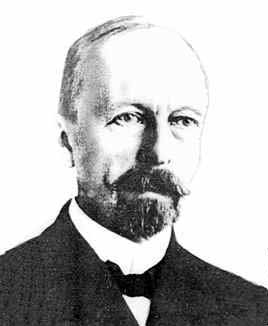


 تاريخ الرياضيات
تاريخ الرياضيات
 الرياضيات في الحضارات المختلفة
الرياضيات في الحضارات المختلفة 
 الرياضيات المتقطعة
الرياضيات المتقطعة
 الجبر
الجبر
 الهندسة
الهندسة 
 المعادلات التفاضلية و التكاملية
المعادلات التفاضلية و التكاملية 
 التحليل
التحليل
 علماء الرياضيات
علماء الرياضيات |
Read More
Date: 27-3-2017
Date: 30-3-2017
Date: 17-3-2017
|
Died: 7 March 1922 in Oslo, Norway

Axel Thue was the son of Niels Thue and Nicoline Cathinka Eger. He studied at Voss's school in Oslo, where he showed a great interest in physics, completing his studies there in 1883. He then enrolled at the University of Oslo graduating in 1889. He went to Leipzig in 1890 and spent a year studying under Lie. However, [1]:-
... his works do not reveal Lie's influence, probably because of Thue's inability to follow anyone else's line of thought.
He also spent a while in Berlin where he attended lectures by Helmholtz, Fuchs and Kronecker. Back in Olso, Thue held a scholarship in mathematics from 1891 to 1894. On 6 July 1894 he married Lucie Collett Lund who was ten years younger than Thue. Then Thue was appointed to Trondheim Technical Collegewhere he worked from 1894 until 1903. He was appointed as professor of applied mathematics at Oslo University in 1903. He held this post until his death in 1922.
In 1909 he produced an important paper, published in Crelle's Journal, on algebraic numbers showing that, for example, y3 - 2x2 = 1 cannot be satisfied by infinitely many pairs of integers. His work was extended by Siegel in 1920 and again by Klaus Roth in 1958.
Edmund Landau, in 1922, described Thue's work as:-
... the most important discovery in elementary number theory that I know.
Thue's Theorem states that:-
If f (x, y) is a homogeneous polynomial with integer coefficients, irreducible in the rationals and of degree > 2 and c is a non-zero integer then f (x, y) = c has only a finite number of integer solutions.
His contributions to the theory of Diophantine equations are discussed in [3]. In fact Thue wrote 35 papers on number theory, mostly on the theory of Diophantine equations, and these are reproduced in [2].
Another famous contribution made by Thue was his 1910 paper on the word problem for finitely presented semigroups.
If this work seems a little strange for a professor of applied mathematics then some quotes from Thue will clarify where he stood the issue of applications. He wrote a many articles in series between 1906 and 1912 and he wrote in one of them:-
For the development of the logical sciences it will be important to find wide fields for the speculative treatment of difficult problems, without regard to eventual applications.
Another quote from Thue on applied mathematics (see for example [1]) is:-
The further removed from usefulness or practical application, the more important.
Books:
Articles:



|
|
|
|
التوتر والسرطان.. علماء يحذرون من "صلة خطيرة"
|
|
|
|
|
|
|
مرآة السيارة: مدى دقة عكسها للصورة الصحيحة
|
|
|
|
|
|
|
نحو شراكة وطنية متكاملة.. الأمين العام للعتبة الحسينية يبحث مع وكيل وزارة الخارجية آفاق التعاون المؤسسي
|
|
|